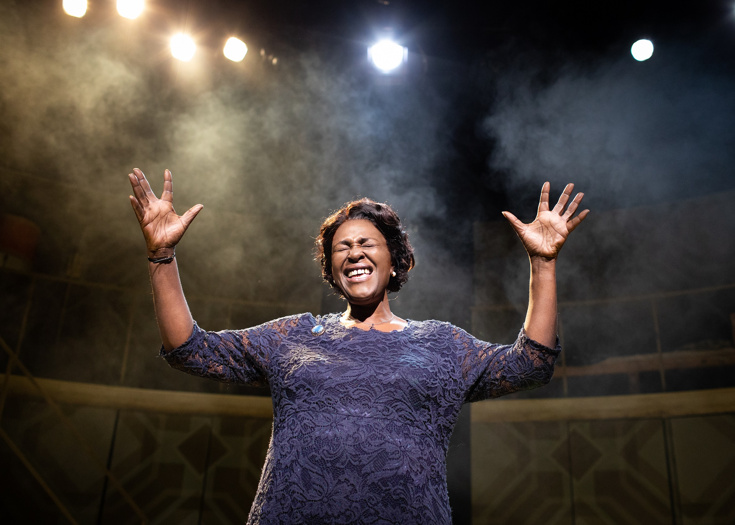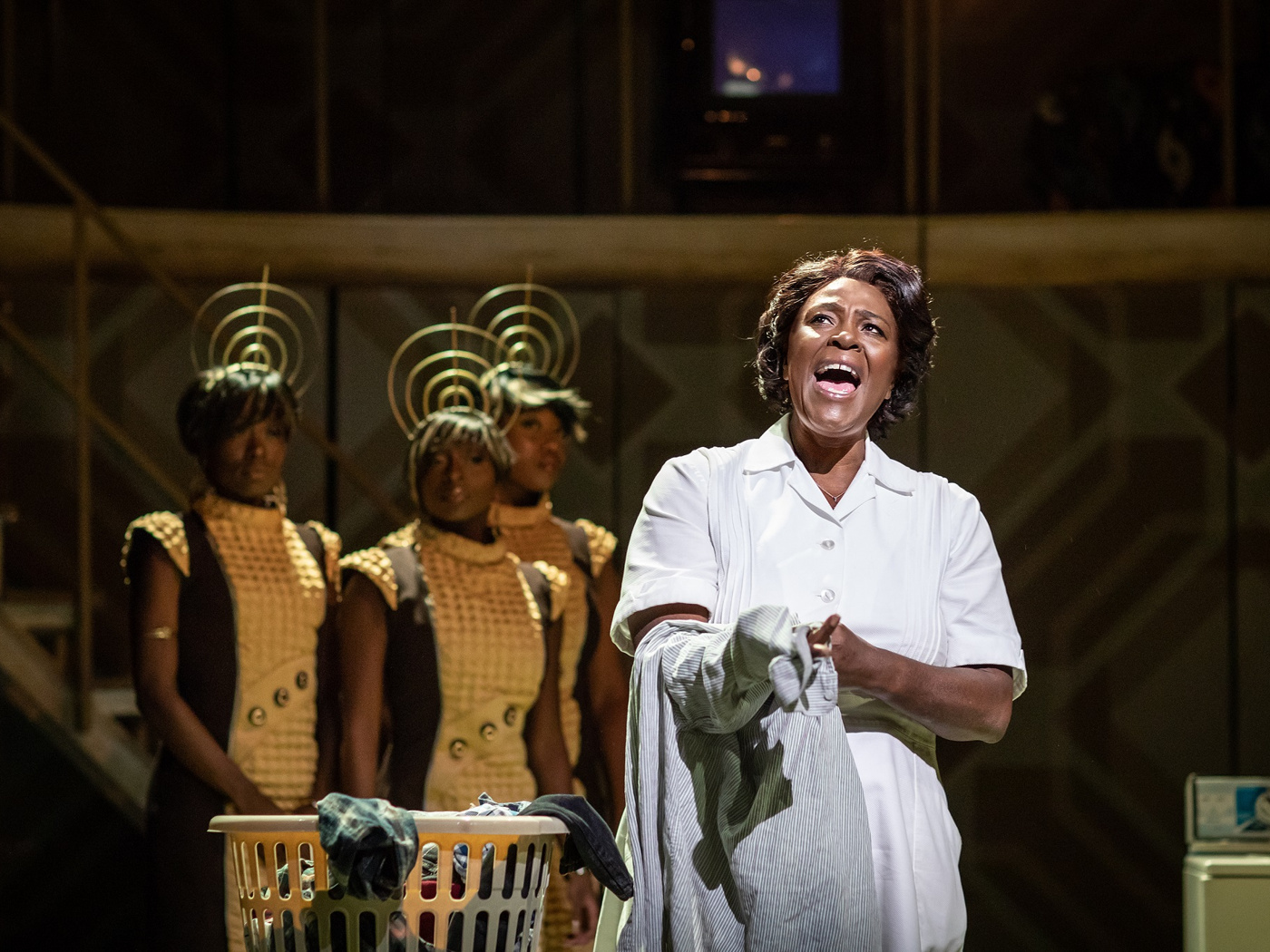Caroline, or Change Star Sharon D. Clarke on Playing Americans on the London Stage & More

(Photo: Helen Maybanks)
The English performer Sharon D. Clarke has lent her formidable presence to many an American title on the London stage, from her 2014 Olivier Award-winning performance in James Baldwin’s The Amen Corner to Ghost the Musical, Ma Rainey’s Black Bottom, and her current and tumultuous star turn as Caroline Thibodeaux in the Tony Kushner/Jeanine Tesori musical Caroline, or Change. Though keen to safeguard her voice, the ever-buoyant Clarke took time one recent afternoon to talk to Broadway.com about the challenges, and the thrill, of inhabiting this part eight times a week at the Playhouse Theatre.
How are you coping with this momentous role?
What’s wonderful is that [the Playhouse] is our third theater [following runs in Chichester and the Hampstead] and we’ve had pauses in between where I have had time first of all to forget the part completely and then to take stock and come at it again. It’s a big sing so to be able to then get the time off that you need for the voice to recover means you can come at it still fresh. It’s not like I’m going, “Oh my God, I’m in my 50th week and I’m dying!”
What are you building into your routine so as to keep match fit for the part into April?
Sleep! Sleep and water: I live with my straw. If I don’t get eight hours sleep, I’m not singing anything and if I can get nine hours sleep then I’m good. It’s not a straight sleep, though, because I drink so much that I’m up through the night going to the loo—the sleep is all broken up.
Did you know the show prior to being offered it?
Yes, I went along to see it [at the National in 2006, with Tonya Pinkins recreating her Broadway role] because I had friends in the cast: Clive Rowe and Anna Francolini. Like most people coming to see Caroline, or Change, I was, like, “What the hell is this? What do you mean there’s a washing machine in it?” And what I got was something so moving and deeply charged with history. I went from, “What am I seeing?” to “What have I just seen?!”
Have you been chasing the part of Caroline ever since?
Absolutely not. When I heard that Ma Rainey’s Black Bottom was happening at the National, I did say to [NT artistic director] Rufus Norris, “I hear you’re doing Ma Rainey; that’s all I’m saying.” But this one came about when I got a call from [Chichester artistic director] Daniel Evans who asked me if I would do the show and I said, “Yes, of course” and thought to myself, “thank goodness I know the score and know the role.”
Do you think Caroline listens to the music of Ma Rainey on the radio that features prominently as a character in your show?
Oh yeah, she comes from that era! Ma Rainey would have been right about that time, and Caroline would have definitely listened to her growing up and to someone like Bessie Smith. She would have found knowledge in [those singers’] pain and in their recognition of what life can be like.

How do you build each night towards the great 11 o’clock number, “Lot’s Wife,” which you have performed on several occasions as a standalone showstopper?
That song is all about the culmination of every feeling Caroline has had from the top of the show: pent-up anger, anxiety, guilt, loss, grief. Then comes the moment where she has to come to terms with everything and release it in song. She rages and rages and rages and then asks for forgiveness.
Given the show's cast of characters includes an array of singing appliances, are you ever disappointed in your home life to have a washing machine that doesn’t sing?
[Laughs.] I love that: no one’s ever asked me that before! You know, if Me’sha Bryan [who plays the part onstage] popped out of my washing machine, I think I would shit my pants. I think I would also sit back and let the soap wash over me!
How do you feel to be moving on directly from this to Marianne Elliott’s much-anticipated all-black revival at the Young Vic in May of Death of a Salesman, co-starring Wendell Pierce from TV’s The Wire?
What is really lovely is to be 40 years into my career and to now be at a stage where I am approached by people, as I was with Marianne who said she’d like to meet me to discuss [Salesman]. We talked about the piece and what I thought of Linda Loman and what might be my way in with her and at the end she asked me if I wanted to do it and I said yes. Don’t get me wrong: there are roles where I’ve still got to audition but to just get a phone call about a role is a great place to be.
Do you think it will help playing Linda to have lived with the pain of Caroline?
Yes, in that I think everything feeds into everything else you do; you take those experiences with you. But these are different women with different reasons for doing what they do. The one thing I think they have in common is the protectiveness of their love: Linda’s every waking moment is about protecting her man even though she knows what he’s doing to himself. Her man is her focal point, and so that’s her drive.
Are people sometimes surprised to hear that you are in fact English, given your American-intensive stage resume?
I do get that. I’ve done Q and A’s after the show where I’ve started talking and they go, “Oh my God, you’re not American! Say something in an American accent.” And I think, you’ve just watched the show for two-and-a-half hours. Why do I need to say something now in an American accent? Did you not hear me in the show?
From there, you move on yet again to a 30th-anniversary revival at the Kiln Theatre in the summer of Blues in the Night, directed by your wife, Susie McKenna?
That’s going to be a much lighter gig than playing someone like Caroline, or Linda. I wouldn’t say it’s a holiday but it should be more vibrant and full of life, and I’ll get the chance to do some dancing which might help keep some of the weight off [laughs].
After all this American work in Britain, are you tempted to do some American work in America?
The only time that ever came close was on Ghost the Musical, where they said that they might take me [to New York] but in the end were only allowed to take [male lead] Richard Fleeshman, which made a lot more sense since he and Caissie Levy were the central couple. That’s as close as I’ve come, but if someone wants to bring my ass to Broadway, I’m quite happy to go. I’ll go wherever the work is!
Star Files
Articles Trending Now
- Death Becomes Her, Maybe Happy Ending, Oh, Mary! and More Earn Nominations for the 2025 Broadway.com Audience Choice Awards
- Maybe Happy Ending Will Be Hitting the Road on a National Tour, Launching Fall 2026
- Ali Louis Bourzgui Reflects on Joining Hadestown, His Upcoming Album and Processing the Experience of Tommy
